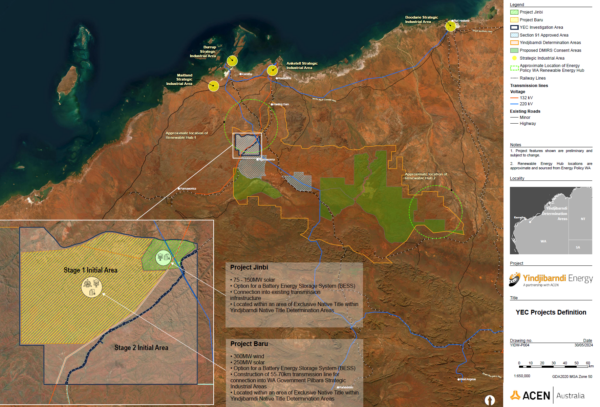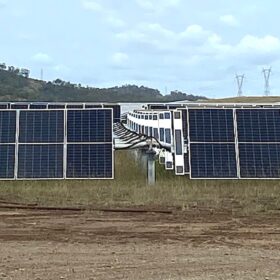Yindjibarndi Ngurra (Country)-headquartered renewable energy developer Yindjibarndi Energy Corporation (YEC) has received development application approval from the Western Australia (WA) Shire of Ashburton for a 150 MWp solar farm in the Pilbara region.
Subject to conditions, the solar array known as Project Jinbi will be built on 5.27 square-kilometres of unallocated crown land, comprise 325,000 tracking system mounted solar panels, with an initial installment of 160,000, include 48 inverters, and generate enough electricity to power 40,000 homes annually.
Jinbi Solar Farm will generate renewable energy for Pilbara-based projects owned by London-headquartered mining and materials company Rio Tinto in accordance with a memorandum of understanding (MoU) signed in October 2023, and is expected to be operational in the second half of 2027.
It will convert a portion of the generation mix within the North West Interconnected System (NWIS) from fossil fuels, primarily gas, to renewable energy.
YEC Chief Executive Officer Craig Ricato said YEC is thrilled to receive the approval, which brings it one step closer to realising its vision for a First Nations led, greener future in the region.
“As one of Australia’s largest indigenous-led renewable energy intitiatives, YEC is proud to be developing large-scale renewable energy projects to decarbonise Pilbara mining and industrial companies,” Ricato said.
Yindjibarndi Aboriginal Corporation Chief Executive Officer Michael Woodley said the approval marked a significant moment for the community which has been directly involved in conducting heritage and environmental surveys.
“This project represents not only a step towards an environmentally sustainable future but also the empowerment and economic development of the Yindjibarndi community,” Woodley said.
Through our partnership with the ACEN Corporation, we are demonstrating the vital role Indigenous leadership can play in driving innovative renewable energy solutions which can benefit both communities and industry. I also want to take the opportunity to thank both Rio Tinto and the WA state Government for their support in bringing this project closer to fruition.”

Image: Yindjibarndi Energy Corporation
The proposed 25-year design life project is approximately 56 kilometres south of coastal Pilbara township Karratha and 1,500 kilometres north of Perth, adjacent to the Millstream Chichester National Park.
The development will be co-located with an existing Rio Tinto substation and high-voltage transmission infrastructure, which Rio Tinto is upgrading to accommodate he solar farm’s generation capacity.
Project Jinbi is the initial stage of a larger renewable energy project to include up to 1 GW of renewable generation capacity on YEC landholdings.
The latter part of phase 1 (Project Baru) to the west of the subject land is expected to accommodate 300 MW of wind, 250 MW of solar and an additional 55-70 kilometres of transmission infrastructure.
Battery energy storage systems (BESS) are considered for future integration into Jinbi and Baru, but not currently proposed.
YEC is a partnership between the Yindjibarndi Aboriginal Corporation (YAC) and Philippines-headquartered renewables developer ACEN Australia, a subsidiary of the Phillippines-based conglomerate Ayala Group.
Formed in 2023, YEC is one of Australia’s largest Indigenous-led renewable energy initiatives, aiming to develop up to 3GW of wind, solar, and energy storage projects within the 13,000 km² in the Yindjibarndi Native Title Determination Areas.
Updated: 10 December 2024
This content is protected by copyright and may not be reused. If you want to cooperate with us and would like to reuse some of our content, please contact: editors@pv-magazine.com.








By submitting this form you agree to pv magazine using your data for the purposes of publishing your comment.
Your personal data will only be disclosed or otherwise transmitted to third parties for the purposes of spam filtering or if this is necessary for technical maintenance of the website. Any other transfer to third parties will not take place unless this is justified on the basis of applicable data protection regulations or if pv magazine is legally obliged to do so.
You may revoke this consent at any time with effect for the future, in which case your personal data will be deleted immediately. Otherwise, your data will be deleted if pv magazine has processed your request or the purpose of data storage is fulfilled.
Further information on data privacy can be found in our Data Protection Policy.